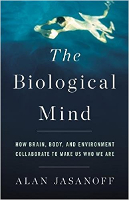2018 School Spending Survey Report
The Inner Mind | Science & Technology
A good read for neuroscientists as well as general readers, taking a slightly simplified look at the brain and how humans interaction and study of the mind have changed; A thoughtful look at the current state of neuroscience through experiments and practices, highly recommended for those interested in the brain and the many ways to improve it
 Cerebral mystique, according to Jasanoff (director, MIT Ctr. for Neurobiological Engineering), results in elevating the importance of the brain to such an extent that it is viewed as containing the essence of who we are as individuals. In the past, the soul was thought to encompass our humanity (our personalities, intellect, etc.), but today the brain has replaced the soul as the repository of our unique beings. This phenomenon, argues Jasanoff, is problematic. The brain should be seen as biologically based; it works in conjunction with the rest of the body as well as the external environment in which it grows and develops. Jasanoff first explores how neuroscience has contributed to the cerebral mystique of the brain. He then examines how our world might be improved by a more biologically centered view of the organ. VERDICT Taking the brain off of its pedestal, Jasanoff offers an exhaustive, comprehensible, and at times playful (e.g., why do humans now study brains instead of eat them?) look at the brain. Appropriate for both neuroscientists as well as general readers interested in gaining a better understanding of this vital organ.—Ragan O’Malley, Saint Ann’s Sch., Brooklyn
Cerebral mystique, according to Jasanoff (director, MIT Ctr. for Neurobiological Engineering), results in elevating the importance of the brain to such an extent that it is viewed as containing the essence of who we are as individuals. In the past, the soul was thought to encompass our humanity (our personalities, intellect, etc.), but today the brain has replaced the soul as the repository of our unique beings. This phenomenon, argues Jasanoff, is problematic. The brain should be seen as biologically based; it works in conjunction with the rest of the body as well as the external environment in which it grows and develops. Jasanoff first explores how neuroscience has contributed to the cerebral mystique of the brain. He then examines how our world might be improved by a more biologically centered view of the organ. VERDICT Taking the brain off of its pedestal, Jasanoff offers an exhaustive, comprehensible, and at times playful (e.g., why do humans now study brains instead of eat them?) look at the brain. Appropriate for both neuroscientists as well as general readers interested in gaining a better understanding of this vital organ.—Ragan O’Malley, Saint Ann’s Sch., Brooklyn RELATED
RECOMMENDED
TECHNOLOGY
ALREADY A SUBSCRIBER? LOG IN
We are currently offering this content for free. Sign up now to activate your personal profile, where you can save articles for future viewing









Add Comment :-
Comment Policy:
Comment should not be empty !!!